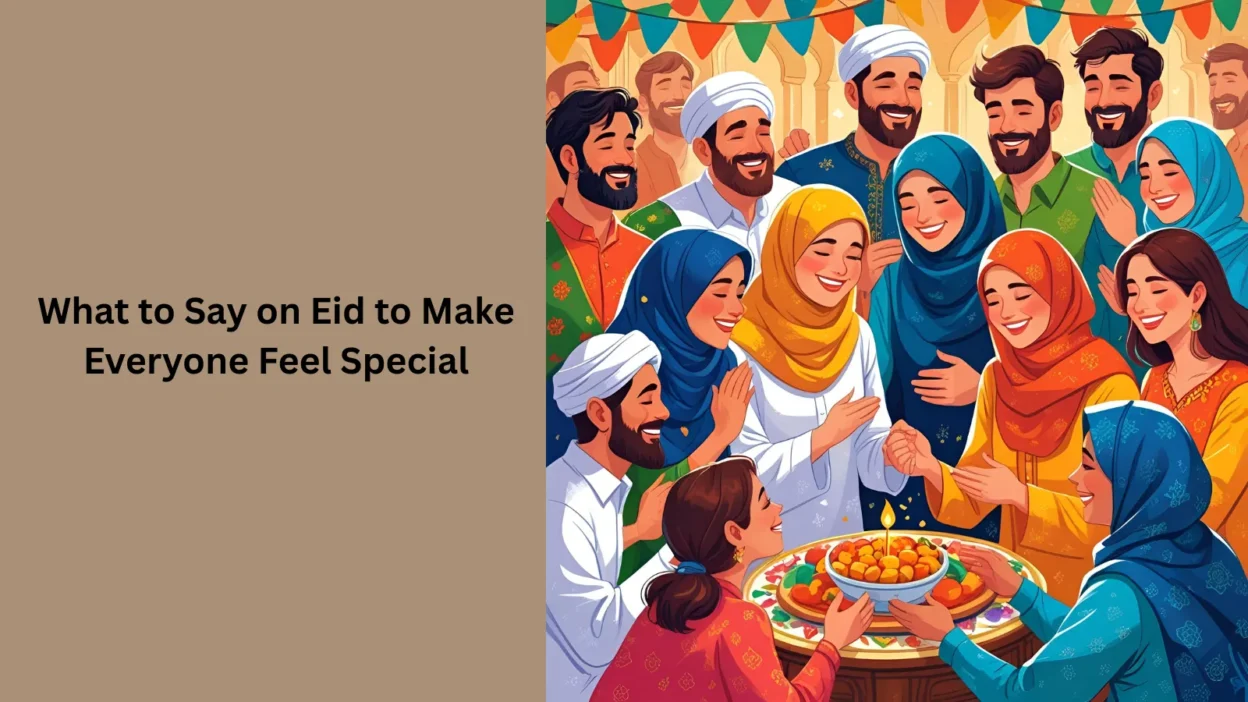Eid is more than just celebrations—it’s a moment to connect hearts, spread joy, and make your loved ones feel truly valued. But when it comes to expressing those warm feelings, many people wonder what to say on Eid to make everyone feel special.
The right words can brighten someone’s day, strengthen bonds, and leave a lasting impact. Whether you’re texting a friend, replying to a family member, or posting a heartfelt Eid message, the way you respond matters.
In this guide, you’ll find thoughtful, respectful, and love-filled Eid replies that make people feel seen and appreciated. Let your words become your gift this Eid.
Traditional Eid Greetings
When it comes to celebrating Eid, traditional greetings are timeless. The most common and beloved phrase is “Eid Mubarak,” which translates to “Blessed Eid.” It’s a simple yet powerful expression of joy, peace, and love, perfect for anyone, whether family, friends, or neighbors.
Example:
“Eid Mubarak to you and your family! May this special day bring happiness, prosperity, and health.”
When to use: This is a safe greeting for anyone you know or meet on Eid. It’s respectful, positive, and traditional.
What not to say: Avoid using overly casual or unrelated greetings that don’t capture the significance of Eid, like “Have a great day!” or “Happy holidays!” These miss the cultural and spiritual meaning of the day.
Offering Prayers for Others
Another meaningful way to wish someone on Eid is by offering heartfelt prayers. As Eid is a spiritual occasion, people often pray for each other’s well-being, success, and peace.
Example:
“May Allah’s blessings bring you peace, joy, and happiness on this blessed Eid. Wishing you a prosperous year ahead!”
When to use: This is perfect for close friends, family, and anyone you want to share deep spiritual goodwill with.
What not to say: Keep away from generic or insincere messages. Avoid non-specific phrases like “Have a great day,” which don’t reflect the spiritual essence of Eid.
Eid Wishes for Family and Loved Ones
Eid is a time for families to come together, and personal messages can truly touch the heart. Share warmth and affection with family members, whether near or far. Personalize your Eid wishes with specific sentiments that reflect your relationship.
Example:
“Eid Mubarak to my beautiful family! I’m so grateful for all the memories we’ve shared this year. May Allah continue to bless us and keep us united.“
When to use: This is perfect for parents, siblings, and loved ones you share a close bond with.
What not to say: Avoid overly formal or impersonal messages with loved ones. Keep it warm, personal, and genuine.
Eid Greetings for Friends
Friends play an important role in our lives, and Eid is a wonderful opportunity to strengthen those relationships. When wishing friends a happy Eid, keep your message lively and filled with joy.
Example:
“Eid Mubarak, my dear friend! May this Eid bring you loads of happiness, laughter, and success. Can’t wait to celebrate with you soon!“
When to use: This is an ideal greeting for close friends or acquaintances.
What not to say: Don’t be too formal with friends. Avoid using greetings that feel distant, like “Hope you have a good holiday.”
Eid Greetings for Colleagues and Business Contacts
If you’re in a professional environment, sharing Eid greetings is a great way to build positive relationships. A respectful and polite message will go a long way in maintaining professional courtesy while showing that you respect their culture.
Example:
“Wishing you a joyous and blessed Eid Mubarak! May your day be filled with peace and happiness.“
When to use: This is perfect for colleagues, supervisors, or business contacts who observe Eid.
What not to say: Avoid overly casual or personal messages in a professional context, as it may come off as unprofessional or inappropriate.
Eid Greetings for the Less Fortunate
Eid is also a time for reflection on those less fortunate, and it’s important to remember to offer well-wishes that include prayers for those in need. Expressing empathy and generosity is a key part of the spirit of Eid.
Example:
“On this blessed day of Eid, let’s remember those less fortunate. May Allah ease their struggles and bring them comfort and hope. Eid Mubarak!“
When to use: This is a thoughtful message for charity workers, volunteers, or anyone involved in giving back to the community.
What not to say: Avoid using generic, happy-only messages that ignore the spirit of compassion and generosity.
Virtual Eid Greetings
In today’s digital age, many people celebrate Eid virtually with friends and family. If you’re sending an Eid greeting via text, email, or social media, you can still make your message heartfelt and special. Consider using video calls or sending personalized voice notes for a more intimate touch.
Example:
“Even though we’re miles apart, my heart is with you this Eid. Wishing you all the joy and blessings of this special day. Eid Mubarak!“
When to use: Perfect for family or friends you can’t be with in person, especially if you want to share a personal moment.
What not to say: Avoid impersonal or short messages like “Eid Mubarak, have a good day!” These are too brief for a significant occasion.
Final Thoughts
Eid is more than just a celebration—it’s a time to express love, gratitude, and prayer for the well-being of those around you. Whether you’re sharing a traditional greeting, offering heartfelt prayers, or connecting with loved ones near and far, what to say on Eid can make all the difference in creating meaningful connections.
So choose your words carefully and let them reflect the joy and blessings of the season. Eid Mubarak!




